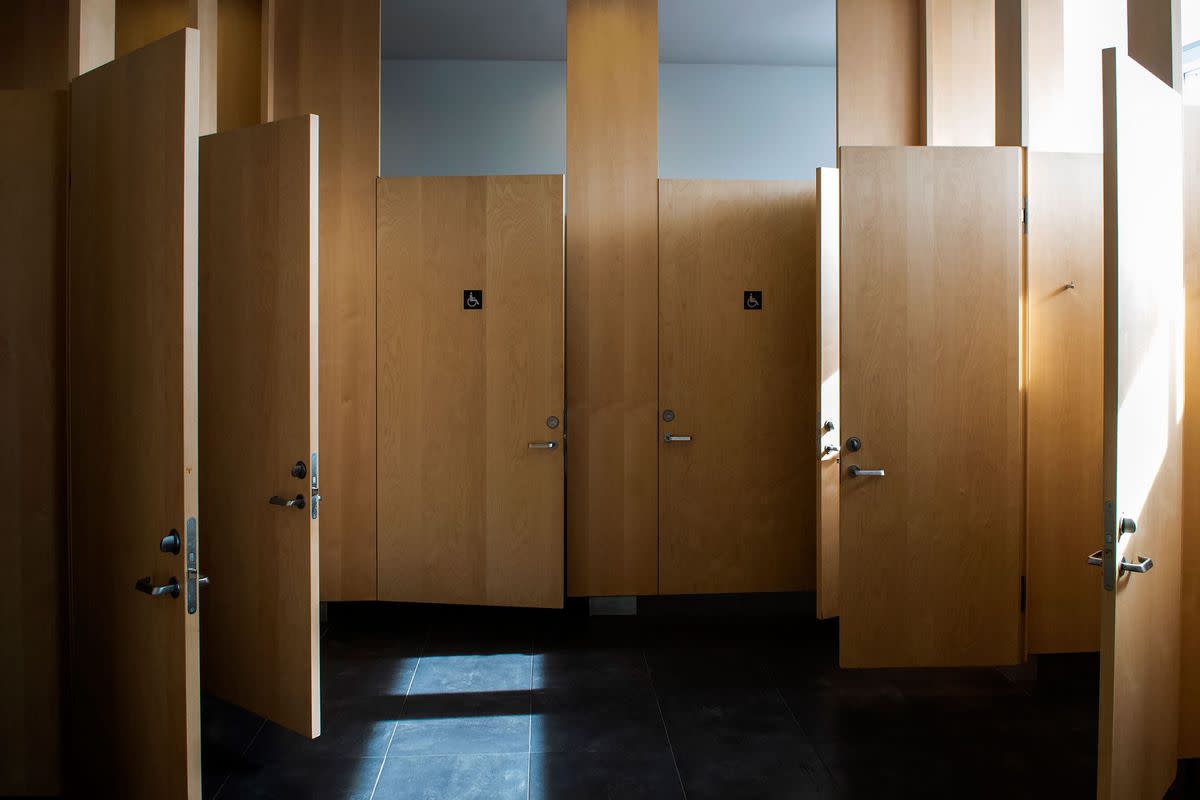Why Is It So Hard to Find a Public Bathroom?

- Oops!Something went wrong.Please try again later.
Miguel Angel Ortega / Getty Images
Recently, I was working from a Starbucks in New York City's Greenwich Village (I am a remote worker and they have great free Wi-Fi, so don't judge me), and I noticed the door that previously housed a public restroom had a new sign that read: "Employees Only." At this moment, I knew the stress of ever finding clean public restrooms was only getting worse. Starbucks CEO Howard Schultz recently announced that he plans to eliminate the open-bathroom policy across stores. This comes as a blow to everyone who just wishes to relieve themselves while running errands. Remember when Charlotte in the Sex and the City film couldn't find a bathroom and she soiled her pants? Yeah, you don't want a Charlotte moment, trust me. The lack of public restrooms in cities across the nation has been a point of discussion for years. The need for more federal, or city funded clean public restrooms is more dire than ever. It is a public health crisis at this point.
RELATED: Starbucks Is Closing 16 Locations Due to Safety Concerns, Including 2 Unionized Stores
For years, many public restrooms in urban centers have been under the jurisdiction of the private sector. Like Starbucks, other businesses like department stores or restaurants, have been the saving grace. Sure, you may have to find the cheapest thing on the menu to purchase so you can use the loo, but it is your only option. Vistaprint should cut them a check for how many signs they can sell to convey: "Restrooms are for paying customers only." I have been seeing many bathroom facilities out of service for unknown reasons, and with the COVID-19 pandemic, businesses have been adamant on closing them to the public altogether. The big question is, do private businesses have an obligation to provide public restrooms, or do city and federal governments?
This debate is nothing new. Canadian journalist Lezlie Lowe wrote a book about it in 2018, titled No Place To Go: How Public Toilets Fail Our Private Needs. The book also analyzes public restroom accessibility globally. The United States, the richest country in the world, has some of the least. Starbucks has always been the butt of the joke for how it essentially was the poster child for handling your private business. They even coined the ideology of it being the public's "third place" between work and home. Schultz's recent statements can be somewhat surprising, considering not too long ago in 2018, the company came under fire after employees at a Philadelphia Starbucks called police to arrest two Black men for allegedly trespassing. The men had asked to use the bathroom while waiting for a friend, and were told by the staff that it was for paying customers only. Then-CEO Kevin Johnson subsequently called the arrest "reprehensible" and pledged that the company would reexamine its practices.
RELATED: Proposed Law Would Finally Allow NYC's Food Delivery Drivers to Use Restaurant Bathrooms
As a company that has prided itself as one of the most progressive companies in the 21st century, retracting one of its most sought-after (and lucrative) services is puzzling. According to Schultz, the need to retract their restroom policy is motivated by the decreased morale of the in-store employees. There is no doubt that upkeeping public restrooms is not a pretty job; no one likes cleaning their own bathroom at home. This is especially daunting for hospitality workers. After hours of standing on your feet, dealing with customers, meal preparation, with little breaks, you are stuck with bathroom duty too. Not cute at all.
The dichotomy of public restroom availability between Europe and the United States has always been the point of contention. Facilities common in continental Europe — like pay toilets — have been seen as a possible resolution. Pay toilets have a turbulent history across the nation, with legislation continuously banning the practice. However, like bell bottom jeans, these things come back now and again. For instance, when New York City piloted pay toilets in Madison Square Park in 2008, it was a complete flop and the rollout never came to fruition. The issue with pay toilets is its lack of accessibility, especially for vulnerable populations such as houseless people, construction workers, and delivery workers. Also the fact that one shouldn't have to spend a quarter to use a facility that is, fundamentally, a human right. Public restrooms should not be like Aldi's shopping carts. Also, according to a report done by the Freedom of Information data, government funded public restrooms in the United Kingdom have fallen 19% in the past six years. Paris has had issues with public restrooms as well, where public urination is guaranteed, and the facilities' cleanliness is optional. (I guess the Europe and U.S. divide is narrowing.)
With the few toilets available, sanitation often falls by the wayside. I have personally passed on relieving myself solely on the basis of filthy restrooms. As a cisgender male, I can at least stand up. Think about women, trans folks, people with disabilities, and people with chronic illnesses, who do not have that convenient luxury. As we can see it happening with Starbucks, relying on private entities is not sustainable. It was a bandaid on a problem that required a trip to the operating room (a.k.a. federal legislation and funding). For now, I keep a list of reliable, clean public restrooms on my phone to stay prepared. I wish I was joking.

